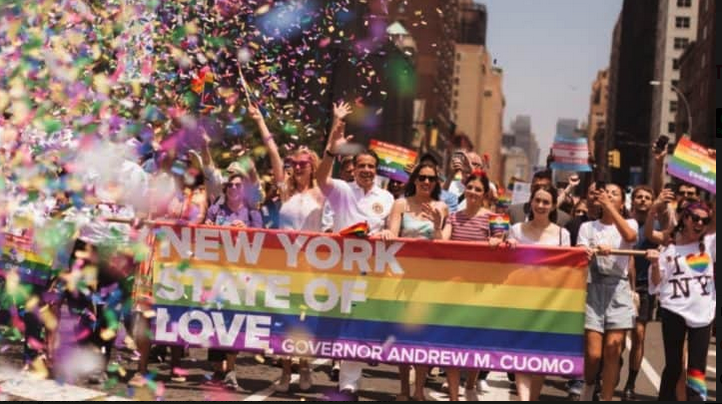The month of June means is it is the annual celebration of LGBTQ+ Pride month, where we remember the progress made since the riots that took place at the Stonewall pub in Greenwich Village at the end of June 1969, which provided a catalyst for the political activism that has led to the massive social changes we’ve seen in the last few decades, including marriage equality in many countries around the world, including the US, Britain and elsewhere.
New York City still holds its annual Pride Day on the last Sunday in June (pictured above) to mark this event, while London typically goes a week later, but throughout the summer different cities and towns around Britain and the rest of the world go rainbow coloured to celebrate their own local LGBTQ communities, including the famous Mardi Gras festival that take place in Sydney in March and Manchester Pride in late August.
To mark our own contribution to LGBTQ+ Pride month, my fortnightly ShenTens podcast is of the G part on LGBTQ, focusing on my Top 10 favourite gay-written and themed plays.
To listen, click here:
1 Bent by Martin Sherman
No play has ever shaken or stirred me as much in my awakening gay identify than Martin Sherman’s Bent, which I saw at its 1979 Royal Court premiere, with Ian McKellen and Tom Bell starring as two gay inmates of a Nazi concentration camp. I was 17 at the time, and utterly transfixed in horror (about an episode in history I knew absolutely nothing about until I saw this play) as well as emotion, at such a heartbreaking story of gay lives and survival in the most extreme circumstances.
It also included one of the most erotic gay seductions in all of gay drama, where one character brings the other to orgasm purely with his spoken words. So the play is also seriously radical.
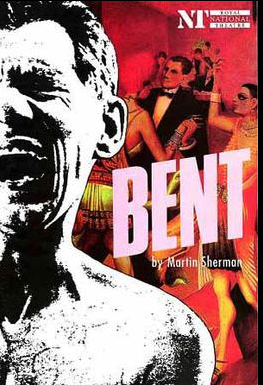
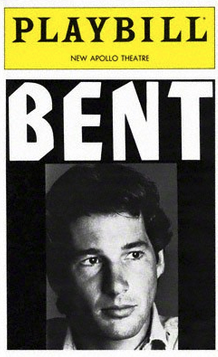
McKellen was not out at the time he first performed the play, but by the time he starred in a National Theatre revival in 1990 (pictured above left), he was. In 1997, he assumed the role of Max’s gay uncle Freddie in the film version that Sean Mathias made of the film. A Broadway production of the play in 1979 starred Richard Gere as Max (the McKellen role, pictured above right).
2 My Night with Reg by Kevin Elyot
Originally premiered at the Royal Court’s Theatre Upstairs in 1994, before transferring to the West End (where it won both the Evening Standard and Olivier Awards for Best Comedy), this beautifully textured play about a group of long-time gay friends amidst the then-unfolding AIDS crisis is a haunting portrait of love, loss and friendship by a playwright who would himself become a long-term survivor of HIV, though it eventually claimed his life in 2014.
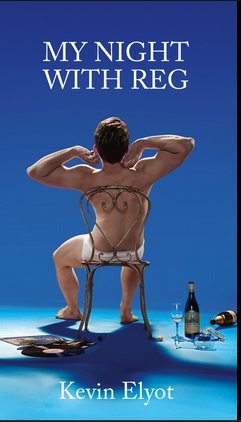
Reviewing the Donmar Warehouse’s 2014 revival on its transfer to the Apollo on Shaftesbury Avenue in February 2015, when the cast included Julian Ovenden, Geoffrey Streatfeild and Jonathan Broadbent, I wrote for LondonTheatre.co.uk:
“Boulevard” comedies used to be a West End staple – the Apollo was once home to the long-running Don’t Dress for Dinner in the early 1990s. They’ve largely vanished from sight, but the gorgeously funny yet utterly heart-breaking My Night with Reg that brings a boulevard comedy back to the same Apollo Theatre could be re-titled ‘Don’t Dress for Breakfast’ (spoiler alert: they don’t dress for breakfast! But in this case, that’s not so much a spoiler as something to whet your appetite.)
But titillation isn’t the business of the day. Rather, its author Kevin Elyot has cleverly appropriated an old-fashioned theatrical form to bring new vigour to it, as he boldly plays with form to chart, across three scenes all set in the same London flat, the changing years amongst a group of once-close former University friends.
When it premiered in 1994 at the height of the AIDS crisis, the crushing spectre of death hung over these characters (as well as the audience watching it). But there’s still an ambushing sense of mortality today (not least because AIDS, although not an instant death sentence anymore, is still claiming lives, and indeed did so for Elyot himself just before this London revival of his play first opened last summer at the Donmar Warehouse).”
The play is being revived again this summer at Battersea’s new Turbine Theatre, running from July 7 to August 21, with a cast that will include Stephen K Amos and Paul Keating (whose West End credits include the title role in the 1996 London transfer of The Who’s Tommy from Broadway, and the Pet Shop Boys musical Closer to Heaven in 2001, both of which he was Olivier nominated for).
3 Beautiful Thing by Jonathan Harvey
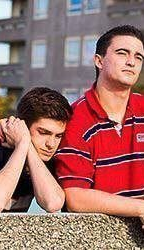
This play is indeed a beautiful thing: a warm, lovely, unaffected play about the first tentative steps towards accepting their sexuality by two gay teenagers, set on a Thamesmead housing estate. Originally premiered at the Bush in 1993, in a production that then transferred to the Donmar and subsequently the Duke of York’s, before being made into a feature film, this play ‘normalises’ gay relationships in a tender, affecting way, and over the years has launched many a theatrical career, including Andrew Garfield (pictured above with Gavin Brocker), and subsequently Jonathan Bailey (now an out-gay actor) in a production at a now vanished theatre in Wardour Street, called the Sound Theatre.
4 The Boys in the Band by Mart Crowley
“Show me a happy homosexual and I’ll show you a gay corpse,” one of the self-hating gay men says in Mart Crowley’s brilliant and bleak play of self-oppression, originally premiered in 1968, a year ahead of the Stonewall riots that ushered in a new era of self-acceptance and pride. But though this play was once derided for not showing a positive image of gay men, it was accurate to the time it was written — and is now rightly regarded as a modern masterpiece.
When Mark Gatiss starred in a London revival in 2016 at the Park Theatre, he told me in an interview for The Stage:
“I’ve wanted to play this part since I saw the film when I was 12 or 13. It’s an important play – it’s fascinating to see where we were, where we have to go, and between that, where we think things have or have not changed.”
(Also in the cast was Mark’s husband Ian Hallard, proving just how much times HAVE changed).
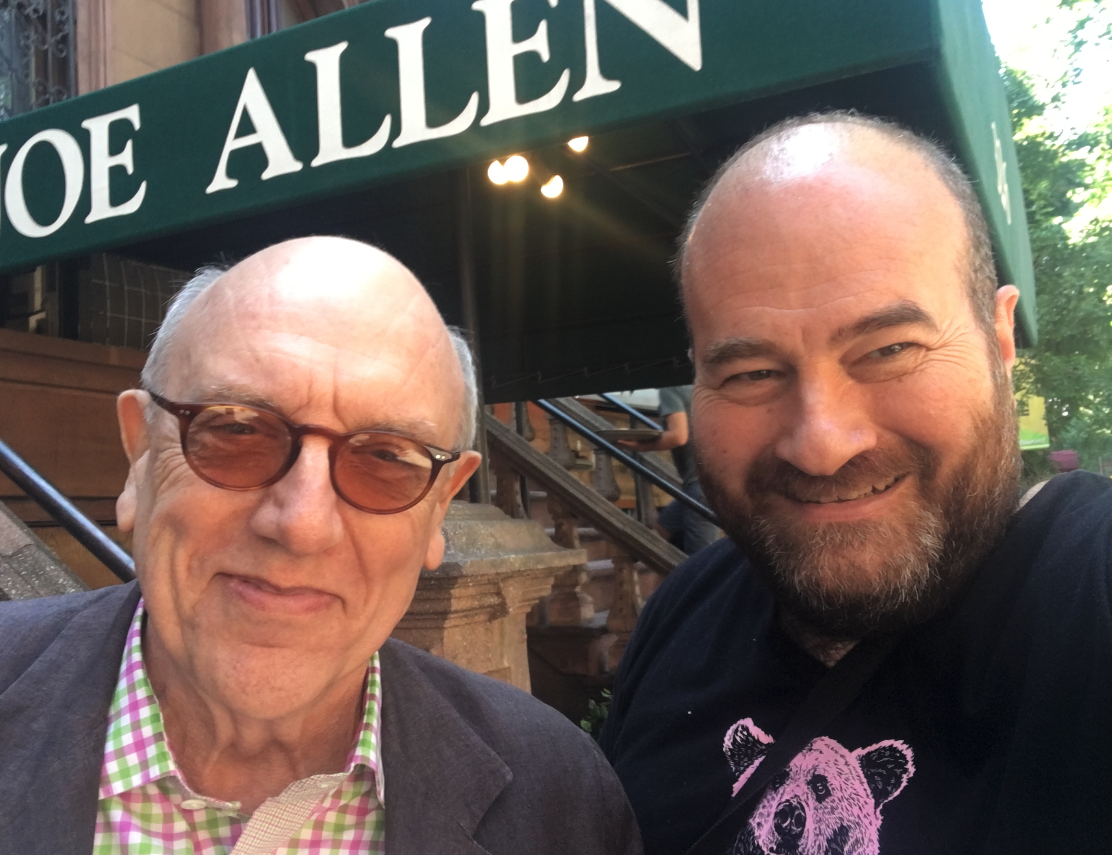
And in 2018, when I met and interviewed Mart Crowley then aged 82, for The Stage over a drink at Joe Allen’s restaurant in New York (pictured above), he told me about the pleasure of seeing the play come back into fashion:
“It’s nice to have lived long enough to have seen that happen. It was awfully depressing to see [the play] go off a cliff, after its initial acceptance, then rejected and decried.” Being ahead of your time, he went on to say, can be tough: “You can’t be behind the times for sure, or you get accused of copying someone who has done it already, but if you are too far out there, too, you also get slammed.”
In 2018 it was revived on Broadway in a production that featured an all-star cast of out gay actors, including Zachary Quinto, Jim Parsons, Andrew Rannells and Matt Bomer. When I reviewed that production for The Stage, I wrote that the play
“marks the theatre’s early tentative steps towards portraying its community both unashamedly and also self-critically…. For all the internalised homophobia and self-loathing openly on display, Crowley’s achievement is to humanise each character amid the bitchy banter to reveal layers of feeling and friendship.”
5 Falsettos by William Finn (music, lyrics, co-book writer) and James Lapine (co-book writer)
Falsettos, a musical created by combining two one-act musicals March of the Falsettos (premiered in 1981) and Falsettoland (1990) into one show, is a wrenching and beautiful portrait of gay men creating an alternate family universe when Marvin leaves his wife Trina and son Jason for a male lover called Whizzer in the first part, and then in the second, following them as Whizzer dies of HIV/AIDS. Of course, March of the Falsettos was written and premiered at Off-Broadway’s Playwright’s Horizons before HIV was even known about; it would receive its British premiere at Manchester’s Library Theatre in 1987 in a production that subsequently transferred briefly to the West End’s Albery (now Noel Coward), where it starred Martin Smith (who would himself die of HIV/AIDS a few years later).
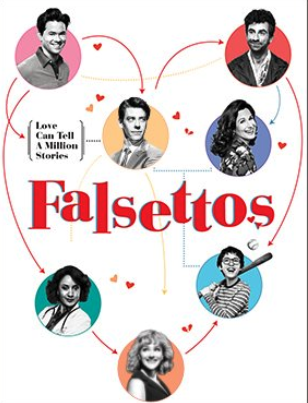
In 1990 a sequel Falsettoland opened, also at Playwright’s Horizons, before transferring to the Lucille Lortel in Greenwich Village. In 1992, the two shows were combined into one as Falsettos, playing at Broadway’s John Golden Theatre; it was subsequently revived in 2016, at the Walter Kerr Theatre (pictured above). In 2019, the double bill received its British premiere as Falsettos at the Other Palace, though the two parts had been separately produced here before.
In an end-of-year round-up for LondonTheatre.co.uk, I named it as one of my top ten musicals of the year, writing:
“At long last, William Finn’s pair of Off-Broadway musicals March of the Falsettos (originally premiered in 1981) and Falsettoland (1990) were seen under their umbrella title as Falsettos in London at The Other Palace this year, after previous Broadway runs in 1992 and again in 2016. I love these musicals individually and together, and a terrific London cast that included Oliver Savile, Daniel Boys and Laura Pitt-Pulford did them proud.”
6 Cat on a Hot Tin Roof by Tennessee Williams
This 1955 Pulitzer prize winning classic by veteran gay playwright Tennessee Williams was one of his few plays to touch explicitly on the repressed sexuality of its unhappily married lead character, an alcoholic called Brick, who is burying his disappointment and shame in the loss of his best friend (who killed himself) in drink. Originally starring Ben Gazzara as Brick, with Barbara Bel Geddes as Maggie the Cat — his tormenting and tormented wife — it also has a leading role for Brick’s dying father, known as Big Daddy, and has regularly attracted star actors in all of these roles.
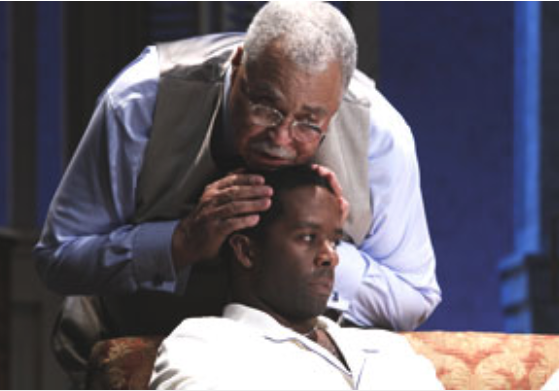
In its 1958 London premiere, directed by Peter Hall, Kim Stanley played Maggie; I was not alive to see that production, but have since seen many, including a Broadway revival in 1990 (Kathleen Turner as Maggie, Charles Durning as Big Daddy), at the National in 1998 (Lindsay Duncan as Maggie, Ian Charleson as Brick), the West End in 2001 (Brendan Fraser as Brick, Frances O’Connor as Maggie, and Ned Beatty as Big Daddy); Broadway in 2003 (Jason Patric as Brick, Ashley Judd as Maggie, and Beatty again as Big Daddy); Broadway again in 2006, with an all-black cast, in a production that was subsequently brought to London in 2009 (where Adrian Lester played Brick and James Earl Jones was Big Daddy, pictured above); and finally Broadway in 2013, where Scarlett Johannson played Maggie, Benjamin Walker was Brick, and Ciaran Hinds appeared as Big Daddy.
In my review of the 2009 all-black production for The Stage, I wrote,
“Adrian Lester has already proved the virtues of colour-blind casting that has seen him playing some of the great classical roles onstage, including Hamlet (for Peter Brook) and Henry V (at the National). But now, in a far more radical step, he leads a colour-specific company in a completely compelling all-black re-imagining of Tennessee Williams’ epic, searing 1955 play that hauntingly re-emphasises the universal themes that resonate through this ever-shattering family drama. Like all great theatre, this is a play that belongs to us all, regardless of skin colour. Only minor tweaks to Williams’ revised 1974 version have been needed to relocate it a new family background.
At the same time, it also lets us see a familiar play through fresh eyes, and gives a sterling company of American and British actors the opportunity to claim it defiantly and definitively for themselves, too.”
7 Torch Song Trilogy by Harvey Fierstein
Harvey Fierstein’s landmark semi-autobiographical play was developed and first premiered at Off-Broadway’s La Mama in 1978 and 1979 as three individual plays (called International Stud; Fugue in a Nursery; and Widows and Children First!) before being combined for a transfer to Greenwich Village’s Actors Playhouse. It subsequently transferred in turn to Broadway’s Little Theatre in 1982 (now the Helen Hayes). Fierstein played Arnold, the drag queen at the centre of the play, with Estelle Getty as his mother (they are pictured below) and Matthew Broderick as his adopted gay son; I saw it there towards then end of its run of over 1,200 performances, when it starred Jonathan Hadary as Arnold.
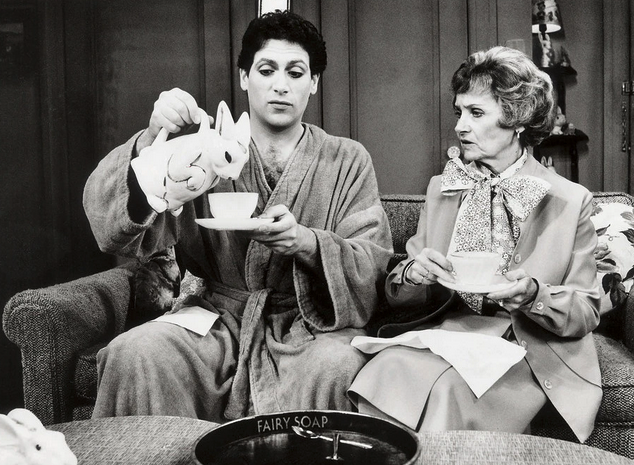
It then came to the West End’s Albery (now Noel Coward) in 1985, with a cast led by Antony Sher as Arnold; it has since been revived here at the Menier, starring David Bedella. In 2017, it was revived at Off-Broadway’s Second Stage Theatre starring Michael Urie — subsequently transferring to the Helen Hayes, its original Broadway home, in 2018. Reviewing that production for The Stage, I wrote,
“Thirty-six years since its Broadway debut, Harvey Fierstein’s Torch Song returns to its original home, now owned and operated by Second Stage Theater, the original producers of this smart, compassionate revival, before its transfer under producer Richie Jackson.
Nothing has changed and yet everything has: between Torch Song’s first appearance and now the gay community has been deeply affected by the legacy and losses of HIV/Aids, yet we also now have gay marriage and adoptions in the US and much of Europe, which this play so presciently and powerfully anticipates.
Fierstein was ahead of his time in this autobiographically-charged drama about a drag queen navigating the forever choppy waters of family and relationships.”
8 The Normal Heart by Larry Kramer
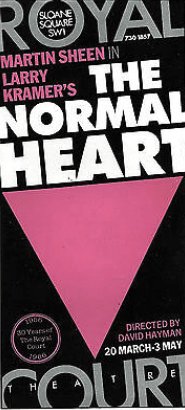
This bleak but powerful play, one of the earliest theatrical responses to the emerging AIDS crisis of the early 80s, by provocateur and activist Larry Kramer, co-founder of ACT UP, and fuelled by his alternately alienating and exhilarating rage of how the authorities failed so dismally to respond to the crisis, and how the gay community, too, failed to accept responsibility, too. It premiered at New York’s Public Theater in 1985, with a cast led by Brad Davis as Ned Weeks (Kramer’s campaigning alter ego); it came to London the following year to the Royal Court, in a production that starred Martin Sheen, before transferring to the West End’s Albery Theatre (now the Noel Coward).
As a Cambridge undergraduate, Sam Mendes directed a student production in 1988 that featured Nick Clegg — formerly Lib-Dem party leader and now a senior Facebook executive — as Ned’s lover Felix. Most recently the play had an all-star Broadway revival in 2011, and will be seen again at the National Theatre next year.
9 The Inheritance by Matthew Lopez
This 2018 two-part masterpiece, inspired by EM Forster’s Howard’s End, premiered at London’s Young Vic, before transferring to the West End’s Noel Coward, and then to Broadway in 2019 (where its run was curtailed by the arrival of COVID and the shutdown of theatres there).
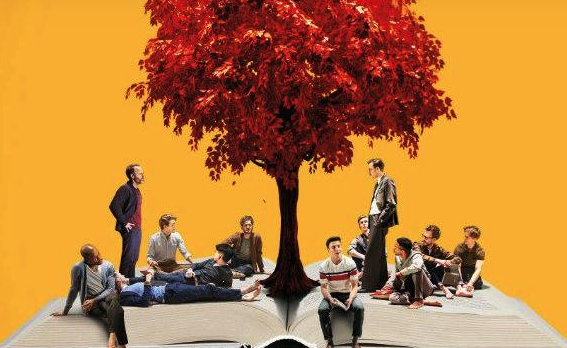
When I reviewed the West End transfer for LondonTheatre.co.uk, I wrote,
“During one of the intervals for The Inheritance, newly transferred from the Young Vic where it premiered in March to the West End’s Noel Coward Theatre, I ran into Martin Sherman, who wrote one of the great gay plays of my lifetime in Bent, a shattering account of gay life (and death) in a Nazi concentration camp. I was a 17-year-old gay man just coming to terms with my sexuality when this forever-potent play first premiered in 1979 at the Royal Court and it exposed me to a heart-breaking legacy that I’d not been aware of until then, but also showed the overwhelming power of love, even in the most dire of situations.
Sherman told me he was seeing The Inheritance for the third time – and that he considered it to be the greatest modern play ever. And even allowing for a little bit of hyperbole, he has a point, particularly for those of us who want to understand our own history – and acutely mourn an entire generation who were lost to the scourge of AIDS.”
10 Angels in America by Tony Kushner
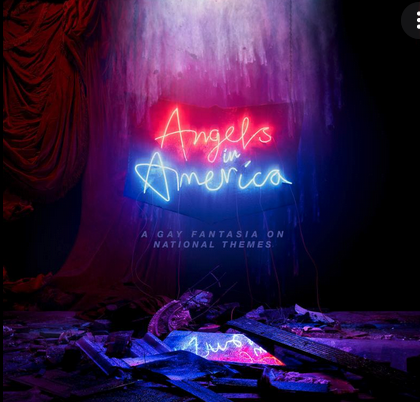
For many, Tony Kushner’s two-part Angels in America is one of the most essential gay plays of our times: an epic survey, across two parts and nearly eight hours running time in the theatre, of gay life in America as the new millennium was on the horizon. (The first part is called Millennium Approaches, and the second Perestroika). Originally premiered at San Francisco’s Eureka Theatre, where it first premiered in 1991, it came to London’s National Theatre in 1992, where Declan Donnellan directed a cast that included Daniel Craig, Jason Isaacs and Stephen Dillane in the Cottesloe studio (now the Dorfman). In 1993, George C Wolfe directed its Broadway premiere at the Walter Kerr Theatre.
I’ll pass discreetly over the (terrible) Lyric Hammersmith revival in 2007, but in 2017 Marianne Elliott directed a stunning revival at the National Theatre, with a cast that featured Andrew Garfield, Russell Tovey, James McCardle, Denise Gough and Nathan Lane, and subsequently transferred to Broadway a year later (but without Tovey).
I reviewed it for The Stage at the National, where I described it thus:
“Tony Kushner’s kaleidoscopic two-play cycle tells the story of the emerging AIDS crisis of the early 1980s as it hit the gay community in New York, with a cast of real-life and fictional figures living through it.
They are dense, but also baggy and they frequently feel infatuated with the sound of their own words. They occasionally seem like a gay version of George Bernard Shaw. But they also play with form in liberating ways: conventional scenes of domestic realism throw off those shackles with abandon to enter hallucinatory realms of fantasy, mystery and mysticism. A character from 1980s New York meets his ancestors from previous centuries; another ends up in the Antarctic; there’s an angel whose wings are so wide they take six people to operate.”
A SPECIAL MENTION….
Though I’ve not included any of Terrence McNally’s plays in my Top Ten list above, few American playwrights of the last half century have so consistently and affectingly charted the experiences of gay Americans than Terrence McNally, who sadly died last year after coming down with COVID, aged 81. Amongst his hit plays was The Ritz (1975), set in a gay bath-house; The Lisbon Traviata (1985), about two devoted Maria Callas fans; Lips Together, Teeth Apart (1991), set on Fire Island against the backdrop of AIDS, but revolving around two straight married couples, and Love! Valour! Compassion (1995), charting the lives of gay men over three acts on three separate American holidays. He also wrote the book for Kander and Ebb’s musical version of Manuel Puig’s prison drama Kiss of the Spider Woman, about a gay window dresser and a straight political activist sharing a prison cell, seen at the West End’s Shaftesbury Theatre in 1992 before transferring to Broadway a year later.
NEXT PODCAST: In a fortnight (on July 3), I will pick up a suggestion from one of our regular listeners, Tony Lacey who hails from the south west of France, to look at my favourite Broadway shows that are yet to make it across the Atlantic.
AND FINALLY:
Special thanks to my producer Paul Branch; Howard Goodall, for theme music; and Thomas Mann for the logo design

